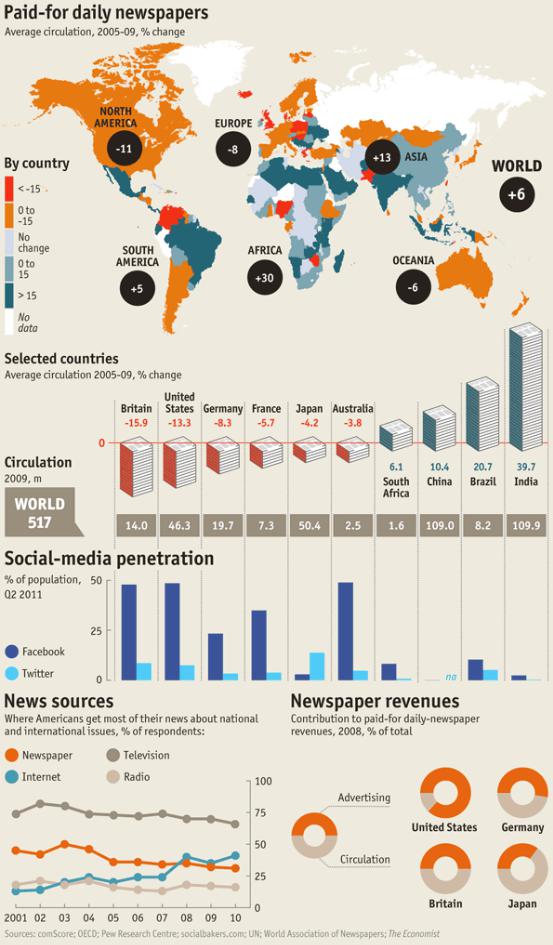
Unit 1. News
.pdf
Unit 1. News
Bulletins from the future
The internet has turned the news industry upside down, making it more participatory, social, diverse and partisan—as it used to be before the arrival of the mass media, says Tom Standage
EVEN IF YOU are not a news junkie, you will have noticed that your daily news has undergone a transformation. Television newscasts now include amateur videos, taken from video-sharing websites such as YouTube, covering events like the Arab spring or the Japanese tsunami. Such
videos, with their shaky cameras and people's unguarded reactions, have much greater immediacy than professional footage. Messages posted on Twitter, the microblogging service, have been woven into coverage of these events and many others. “You have these really intimate man-in-the-street accounts, and you can craft a narrative around them,” says Jack Dorsey, co-founder of Twitter. A computer consultant in Pakistan unwittingly described the raid on Osama bin Laden's compound in a series of tweets. The terrorist attacks in Mumbai in 2008, too, were reported on Twitter in real time by people who were there.
The past year has also seen the rise to fame of WikiLeaks, an organisation that publishes leaked documents supplied to it anonymously. WikiLeaks and its media partners have published detailed records of the Afghan and Iraq wars, hundreds of classified American diplomatic cables and records from the Guantánamo Bay detention centre. “We believe that true information does good,” says Julian Assange, WikiLeaks' founder. “Our goal is not just to have people reading documents, but to achieve political reforms through the release of information.”

Clearly something dramatic has happened to the news business. That something is, of course, the internet, which has disrupted this industry just as it has disrupted so many others. By undermining advertising revenue, making news reports a commodity and blurring the boundaries between previously distinct news organisations, the internet has upended newspapers' traditional business model. But as well as demolishing old ways of doing things, it has also made new ones possible. As patterns of news consumption shift, much experimentation is under way. The internet may have hurt some newspapers financially, but it has stimulated innovation in journalism.
Reporters all
For consumers, the internet has made the news a far more participatory and social experience. Non-journalists are acting as sources for a growing number of news organisations, either by volunteering information directly or by posting comments, pictures or video that can be picked up and republished. Journalists initially saw this as a threat but are coming to appreciate its benefits, though not without much heart-searching. Some organisations have enlisted volunteers to gather or sift data, creating new kinds of “crowdsourced” journalism. Readers can also share stories with their friends, and the most popular stories cause a flood of traffic as recommendations ripple across social networks. Referrals from social networks are now the fastest-growing source of traffic for many news websites. Readers are being woven into the increasingly complex news ecosystem as sources, participants and distributors. “They don't just consume news, they share it, develop it, add to it—it's a very dynamic relationship with news,” says Arianna Huffington, co-founder of the Huffington Post, a news website in the vanguard of integrating news with social media.
As well as making Twitter, Facebook and Google part of the news ecosystem, the internet has also made possible entirely new kinds of specialist news organisations. It has allowed WikiLeaks, for example, to accept documents anonymously and publish them to a global audience, while floating in cyberspace above national jurisdictions, operated by a small, nomadic team.
VOCABULARY NOTES
news – newly received or noteworthy information, especially about recent events; participatory – marked by, requiring, or involving participation;
diverse – showing a great deal of variety; very different; partisan – prejudiced in favor of a particular cause;
mass media – the means of communication that reach large numbers of people in a short time, such as television, newspapers, magazines, and radio;
news junkie – a person with a compulsive habit or obsessive dependency on news; daily news – fresh information on the events occurring every day;
to undergo a transformation – experience or be subjected to a marked change; newscast – a radio or television broadcast of news reports
amateur – someone who does something as a hobby and not as a job; to cover events – report on what happens or takes place;
immediacy – the quality of bringing one into direct and instant involvement with something, giving rise to a sense of urgency or excitement;
footage – the sequences of filmed material;
microblogging – the posting of very short entries or updates on a blog or social networking site, typically via a mobile phone;
man-in-the-street account – a report or description of an event or experience from the typical or ordinary person;
to craft – exercise skill in making (something);
narrative – a spoken or written account of connected events;
unwittingly – not done on purpose; unintentionally; unaware of the full facts; to rise to fame – become famous;
WikiLeaks – an independent, non-profit online media organization that publishes submissions of otherwise unavailable documents from anonymous sources;
leaked documents – documents, especially containing secret information, that have become known;
anonymously – done by a person whose name is unknown or withheld;
media partner – an organization that provides informational support through media coverage;
records –accounts of an act or occurrence kept in writing or some other permanent
form;
diplomatic cable – the term given to a confidential text message exchanged between a diplomatic mission, like an embassy or a consulate, and the foreign ministry of its parent country;
dramatic – sudden and striking;
to disrupt – cause difficulties that prevent something from continuing or operating in a normal way;
to undermine – damage or weaken (someone or something);
advertising – the promotion of goods or services for sale through impersonal
media;
revenue – income, especially when of an organization and of a substantial nature; news report – a short account of the news;
commodity – a useful or valuable thing;
to blur the boundaries – make the dividing lines unclear or less distinct; to upend – turn (something) on its end or upside down;
under way – in progress; being done or carried out;
journalism – the activity or profession of writing for newspapers or magazines or of broadcasting news on radio or television;
heart-searching – thorough, typically painful examination of one's feelings and
motives;
to sift data – examine the information thoroughly so as to isolate that which is
most important;
to crowdsource – obtain (information or input into a particular task or project) by enlisting the services of a number of people, either paid or unpaid, typically via the Internet;
in the vanguard – at the forefront of new developments or ideas.
EXERCISES
1. Questions
1.When the news is accompanied with a video, do you prefer the footage to be professional or amateur? What are the advantages and disadvantages of such videos?
2.What do you know about WikiLeaks? Have you ever learnt any information
from there? How much do you agree with its founder’s statement that “true information does good”? Do you think disclosure of secret information can be dangerous? Give your reasoning.
3.How do you understand crowdsourcing in journalism? What is your attitude to the news based on the information obtained though this channel? Have you ever contributed any information to a newspaper, or a magazine? If yes, what was it about? If not, what would you like to tell about if you were asked to be the news source for your local newspaper?
4.How has technology effected the way that we receive news? What channels and/or media do you usually use to learn about the current news? Do you share what you find interesting or important with your friends using social media? Give examples of the types of information you find worth sharing.
5.Do you think that news reporting has gotten better, gotten worse, or stayed the same over your lifetime? Prove your point.
6.What are your favorite sections in the newspaper? What was the last piece of good/bad news you read?
7.Do you trust everything you read on the news? How do you decide whether the source is trustworthy?
8.Can you judge a news article by its headline? What in your opinion makes an effective headline?
9.How do you feel about censorship? Are there times when the news should be censored?
10.What's happening in the news right now, both in your country and abroad?

2. Panel discussion
Below are some of the most common myths about news media. Read the crossheadings that follow and agree with or refute the statements they contain. Skim the reasoning under each heading and compare it to your own opinions.
Five myths about news media, especially online
1. The traditional news media are losing their audience.
The 25 most popular news Web sites in the United States, for instance, all but two are “legacy” media sources, such as the New York Times or CNN, or aggregators of traditional media, such as Yahoo or Google News. ... The crisis facing traditional media is about revenue, not audience. And in that crisis, newspapers have been hardest hit: Ad revenue for U.S. newspapers fell 48 percent from 2006 to 2010.
2. Online news will be fine as soon as the advertising revenue catches up.
Such hopes are misplaced. In 2010, Web advertising in the United States surpassed print advertising for the first time, reaching $26 billion. But only a small fraction of that,
perhaps less than a fifth, went to news organizations.
3. Content will always be king.
The syllogism that helped journalism prosper in the 20th century was simple: Produce the journalism (or “content”) that people want, and you will succeed. But that may no longer be enough.
The key to media in the 21st century may be who has the most knowledge of audience behavior, not who produces the most popular content.

4. Newspapers around the world are on the decline.
Actually, print circulation worldwide was up more than 5 percent in the past five years, not down, and the number of newspapers is growing. In general, print media are thriving in the developing world and suffering in rich nations.
By and large, American newspapers are suffering the most. Roughly 75 percent of their revenue comes from advertising, vs. 30 percent or 40 percent in many other countries, where papers live and die by circulation. That means the collapse of advertising is not hitting papers elsewhere as hard as it is hitting them here. It also suggests that the need to charge for online access may be even more important abroad.
5. The solution is to focus on local news.
Going “hyperlocal” was the war cry of Wall Street to the news industry five years ago. The reasoning was simple: In the Internet age, when users can access content from anywhere, it didn’t make sense for local operations to compete with the big national news providers.
The problem is that hyperlocal content, by definition, has limited appeal. To amass an audience large enough to generate significant ad revenue, you have to produce a large volume of content from different places, and that is expensive. On top of that, many hyperlocal advertisers are not yet online, limiting the ad dollars.
Now we are entering what might be called Hyperlocal 2.0, and the market is still up for grabs. Google, which garners two-thirds of all search advertising dollars nationally, doesn’t exert similar control over local advertising. Locally, display ads – all those banners and pop-ups — are a bigger share of the market than search ads.
But how to produce local content remains a mystery. ... So far, no one has really cracked the code for producing profitable local news online.
VOCABULARY NOTES
news media – the means of communication, as radio and television, newspapers, and magazines, that reach or influence people;
audience – the readership of a newspaper, magazine, or book;
aggregator – a website or program that collects related items of content and displays them or links to them;
ad – short for advertisement;
to surpass – exceed; be greater than;
content – information made available by a website or other electronic medium; syllogism – deductive reasoning as distinct from induction;
to prosper – succeed in material terms; be financially successful;
newspaper – a publication containing news, feature articles, advertisements, and
correspondence;
on the decline – decreasing, becoming fewer, or less;
circulation – the number of copies sold of a newspaper or magazine; to thrive – grow or develop well or vigorously;
by and large – on the whole; everything considered; collapse – a sudden failure of an institution or undertaking;
local news – news coverage of events in a local context which would not normally be of interest to those of other localities, or otherwise be of national or international scope;
reasoning – the process by which you reach a conclusion after thinking about all the facts;
appeal – the quality of being attractive or interesting; to amass – gather together;
to generate – produce or create;
significant – sufficiently great or important to be worthy of attention; up for grabs – available; obtainable;
to exert control – predominate;

banner – a heading or advertisement appearing on a web page in the form of a bar,
column, or box;
pop-up – an unrequested browser window, esp. one generated for the purpose of
advertising;
III. Video Time
Watch the video “What is the future of the news industry?” And try answering the question yourself. How will you consume news 20 years from now? Will print papers be a thing of the past? http://www.usatoday.com/videos/opinion/2014/07/08/12307313/
Have you ever considered writing a news article yourself? Below are some of the tips on writing good news stories. What in your opinion makes a news article appealing? What other tips would you add to the list?
5 Ways to Write News Stories with Impact
by Glenn Halbrooks
The choices you make as a news writer make a critical difference in whether your news story has impact.
Send a group of news reporters to cover the same story and each will write something different, even while using the same facts. But if you're a reporter who wants to stand out from your competition, there are ways to set your news writing apart from the crowd.
1. Focus on What The Audience Wants to Know Most
The mayor holds a news conference to list all of his accomplishments. He's presenting information the way he wants it told, so that it benefits himself. Look at what he said and consider what the audience wants to know. If the mayor is proud he negotiated a new sewer deal, tell that information in a
